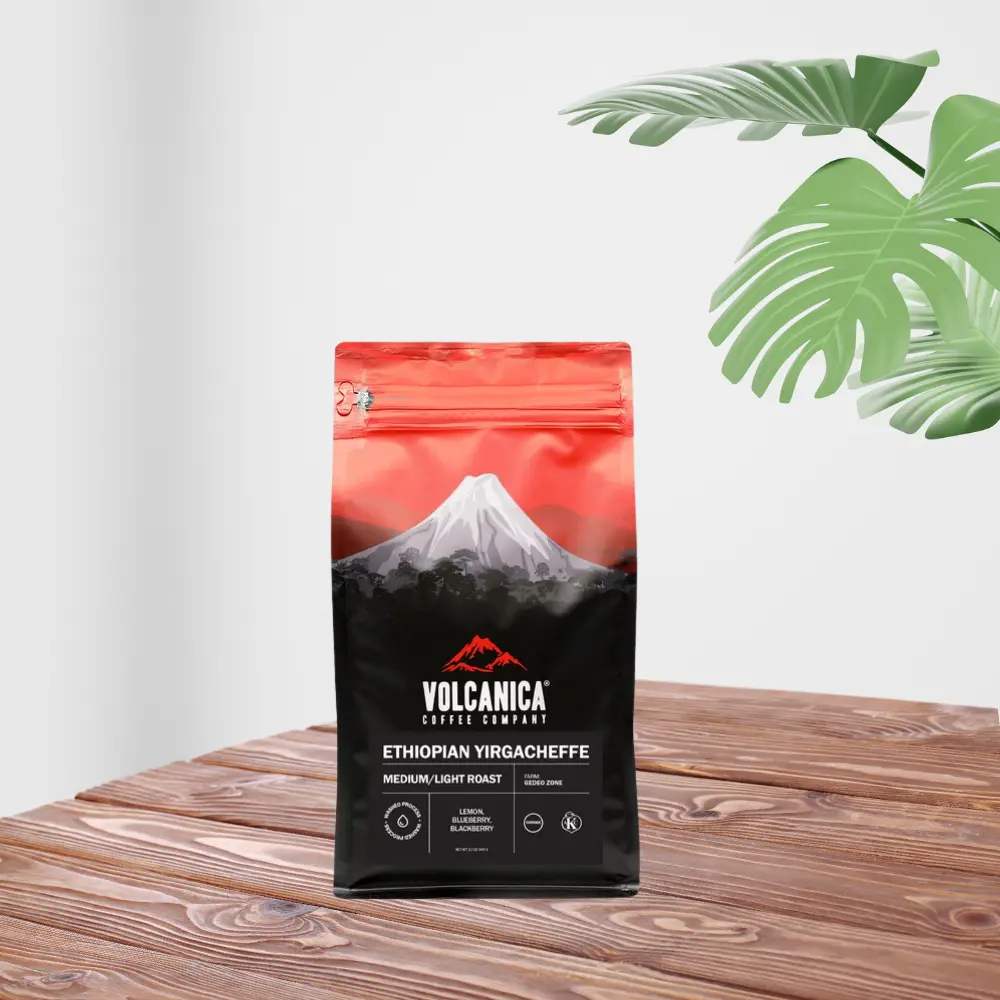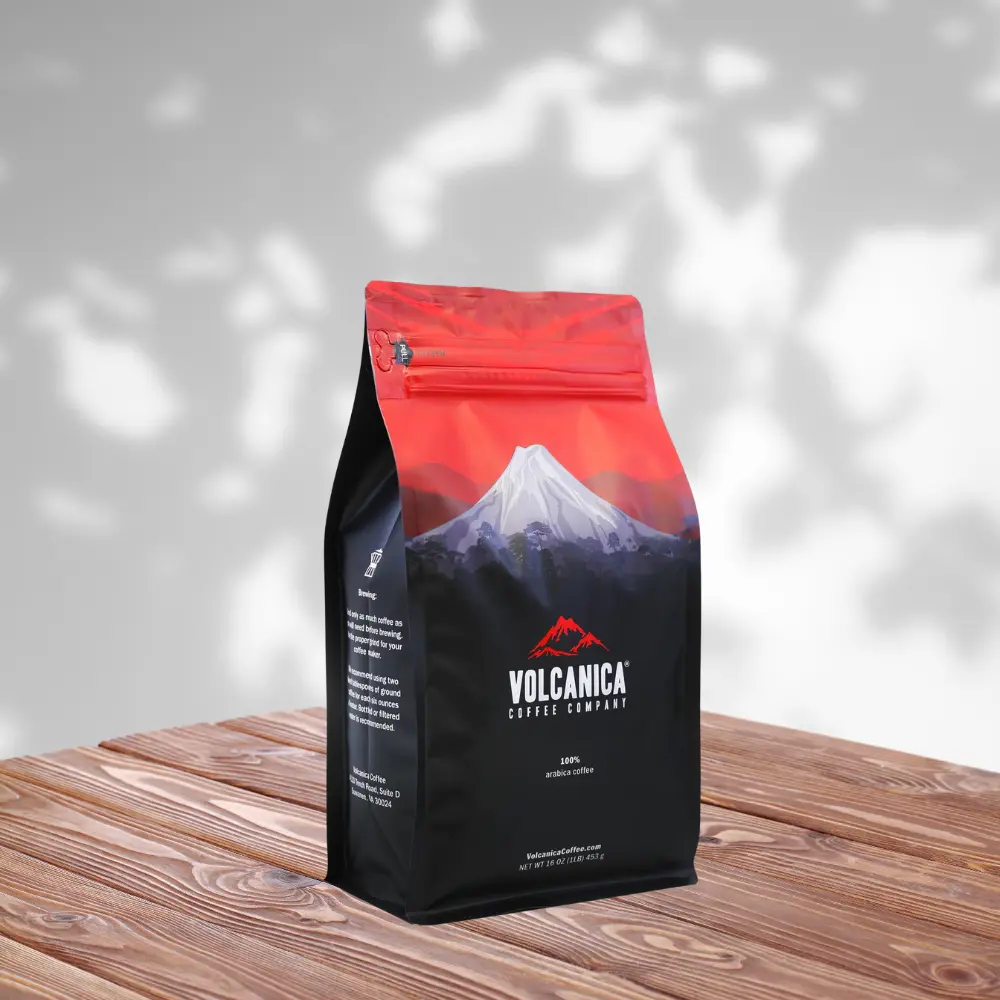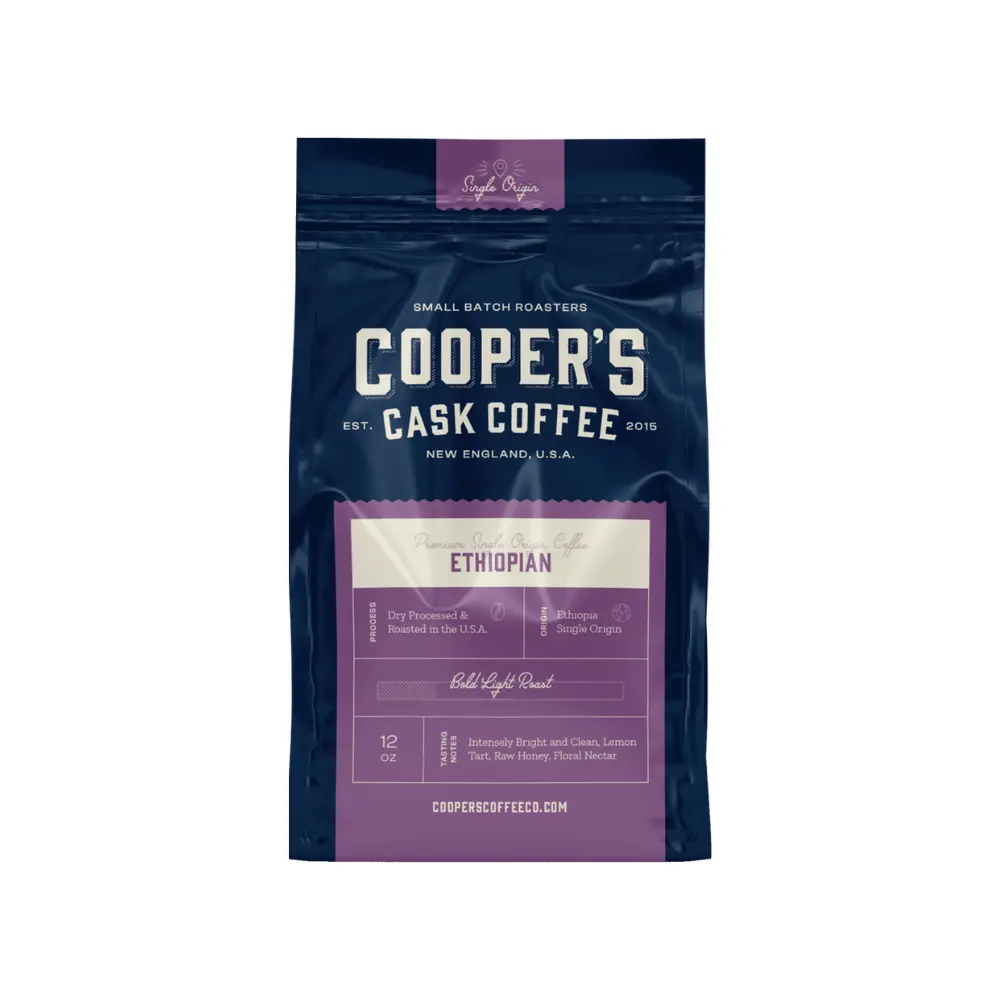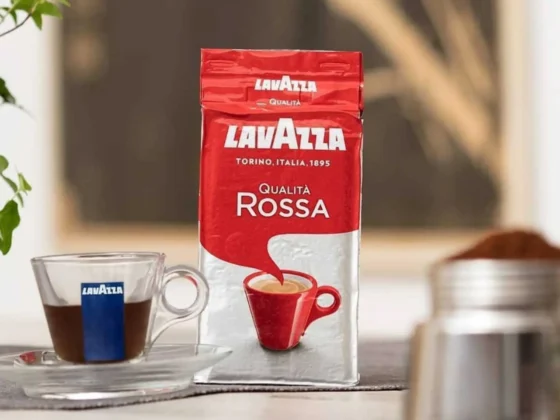Welcome to the aromatic and flavorful world of Ethiopian coffee, a universe brimming with richness and tradition that has been centuries in the making. As we embark on this journey, you’ll discover why the best Ethiopian coffee stands as a testament to the nation’s love affair with the humble coffee bean.
From the sun-kissed slopes of Ethiopia comes an exceptional type of coffee renowned worldwide – Ethiopian Yirgacheffe coffee. With its diverse flavor profile and smooth texture, it has been cherished by coffee connoisseurs the world over and reflects the quintessential spirit of Ethiopian coffee-making traditions.
But there’s more to Ethiopian coffee than just Yirgacheffe. Whether you’re a seasoned coffee aficionado or a casual enthusiast seeking to expand your horizons, this guide is designed to unveil the many layers that make Ethiopian coffee a truly captivating experience. We’ll explore its history, dive into the secrets of its distinct flavors, unravel traditional brewing techniques, and offer tips on selecting and enjoying the finest beans.
So, get your mugs ready as we delve into the captivating narrative of the best Ethiopian coffee, where every sip tells a story of rich culture, tradition, and the undying love for this beloved beverage. Welcome to the heart of this lovely beverage’s homeland. Let the journey begin.
Best Ethiopian Coffee: Key Takeaway
- A Celebration of Diversity: Coffee from Ethiopia is not a monolithic entity, but a diverse collection of unique varieties. From the fruity elegance of Yirgacheffe to the robust flavor symphony of Sidamo, Limu, and Harrar, each type of Ethiopian coffee brings its own unique flavor profile and tasting experience.
- Rich in History and Tradition: The brewing traditions of Ethiopia play a central role in its culture, with the Ethiopian Coffee Ceremony symbolizing unity, warmth, and hospitality. The traditional brewing techniques utilized in Ethiopian homes are not only methods of preparing this beverage but also an integral part of the country’s cultural heritage.
- Quality and Ethical Purchasing Matter: Understanding how to read coffee labels, the importance of buying fair-trade beans, and proper storage methods can significantly enhance this beverage-drinking experience while supporting ethical practices in the industry.
- Tasting Is an Experience Beyond Flavor: The experience of tasting Ethiopian coffee extends beyond the flavors in the cup. Identifying the flavor notes, understanding the best food pairings, and immersing oneself in the process of cupping coffee can offer an enriching and fulfilling experience.
- Top Pick – Volcanica: With a flavor profile that balances floral and fruity undertones with a hint of wine, Volcanica Ethiopian Yirgacheffe Coffee is our top pick. Its refined taste, enticing aroma, and balanced acidity make it an exceptional representation of the rich coffee heritage of Ethiopia.
History of Ethiopian Coffee
The history of Ethiopian coffee is as rich and complex as its flavor profile. It is interwoven with the tapestry of the nation’s culture, forming the basis for both tradition and economy. From a humble shepherd’s discovery to its prevalence in the global market, Ethiopian coffee’s story is one of resilience, growth, and undeniable charm.
The Legend of Kaldi and his Goats
The legend begins with a humble goat herder named Kaldi, who lived around the 9th century in the highlands of Ethiopia. One day, Kaldi noticed his goats exhibiting unusual energy and frolicking around after nibbling on the bright red berries from a particular bush. Intrigued, Kaldi himself tasted these mysterious berries and was amazed by the boost of energy he felt.

He took his discovery to a local monastery, where the monks initially dismissed his claims. But after one monk secretly brewed a drink with the berries to stay alert during evening prayers, the news quickly spread. This anecdotal tale of Kaldi and his energetic goats stands as a charming origin story that bridges the gap between history and folklore, setting the stage for this beverage’s global journey. (1)
Ethiopia: The Birthplace of Coffee
Ethiopia, with its rich soil and ideal climate, is considered the birthplace of this delectable beverage. The indigenous coffee trees found in Ethiopia’s forests are believed to be where the plant, Coffea Arabica, originates. Ethiopian coffee, therefore, represents the oldest, genetically pure form of coffee in existence.
Ethiopian people have had a profound and enduring relationship with this drink. The beverage holds cultural significance, with traditional Ethiopian coffee ceremonies playing an integral role in their social and community life. This ceremony involves the careful roasting, grinding, brewing, and serving of this beverage, often taking place over an hour. It reflects not only its importance in the country but also the community spirit and respect for the time-honored processes involved. (2)
Ethiopian Coffee in the Global Market
Ethiopian coffee’s unique taste and quality have ensured its place in the global market. Today, Ethiopia is one of the world’s largest coffee producers and exporters, with this beverage accounting for around 60% of its total export revenue.
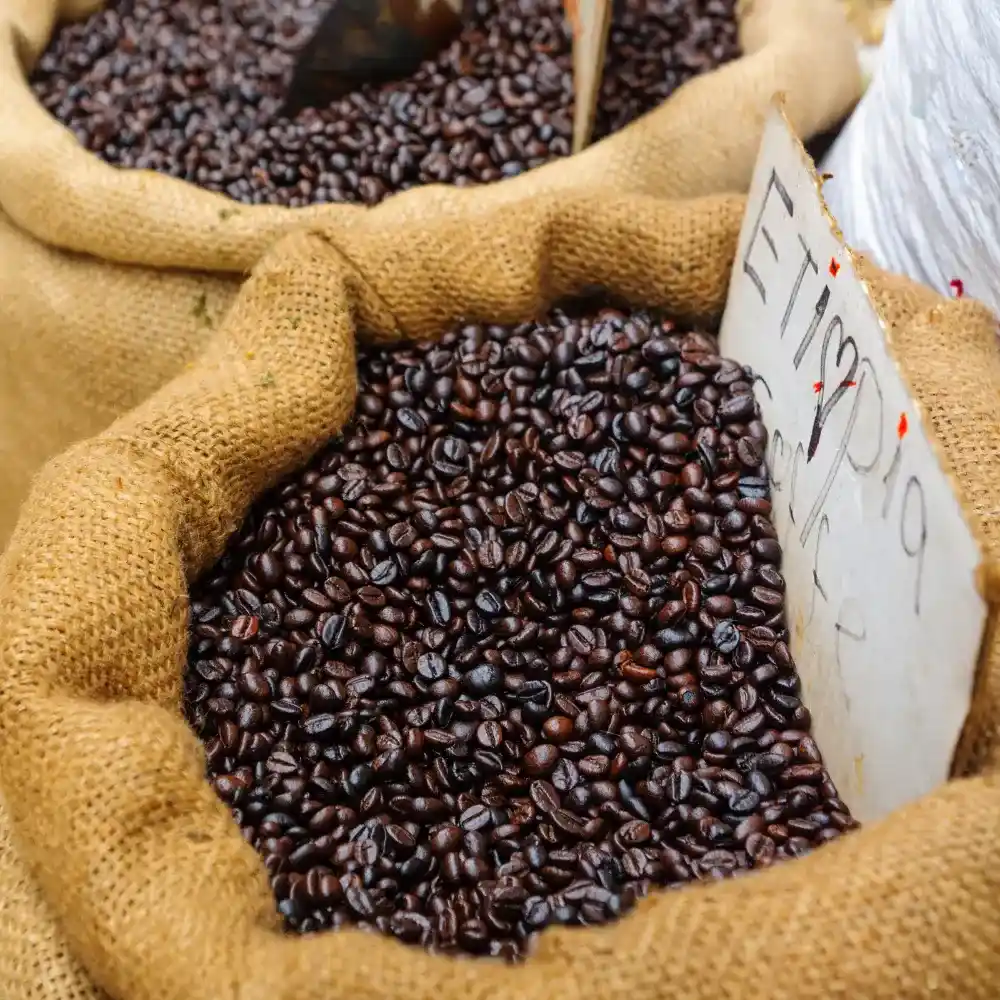
The country offers a diverse range of coffee varieties due to the varying climates and altitudes across different regions, each contributing to a unique flavor profile. Varieties like Sidamo, Harrar, and the famous Yirgacheffe are celebrated globally for their distinct qualities. Ethiopian
beans are sought after by specialty coffee roasters who value their pronounced flavors, ranging from wine-like fruity tones to rich, chocolatey undertones.
As the birthplace of this lovely drink, Ethiopia continues to shape the industry with its exceptional quality, sustainability efforts, and rich cultural heritage that imbues every bean with a story waiting to be told in every brewed cup.
Best Ethiopian Coffee Brands
Embark on a journey through the highlands of Ethiopia, the birthplace of this beverage, where an incredible variety of flavors and aromas bloom. Let’s explore some of the finest Ethiopian coffee brands that have turned this native treasure into a globally recognized masterpiece. These brands not only cater to different tastes and brewing methods but also ensure sustainable and fair trade beans, thus making them some of the best Ethiopian coffee choices for any coffee aficionado.
Volcanica Ethiopian Yirgacheffe Coffee

Volcanica’s Ethiopian Yirgacheffe Coffee invites you on an exciting exploration of the dynamic landscape of southern Ethiopia. This USDA organic blend is a harmonious fusion of delightful acidity and tantalizing fruity notes, wrapped up in a medium-bodied roast. Its enchanting flavor profile is an homage to the Arabica varieties, from which it originates.
- Single-origin coffee from the Yirgacheffe region in Southern Ethiopia
- Boasts USDA Organic, Fairtrade Certified, and Kosher Certified labels
- Medium/light roast profile with balanced flavors
- Features enticing notes of lemon, blueberry, and blackberry
- Patio-dried under the African sun, cultivated in the illustrious Gedeo Zone
Pros:
- Organic and sustainably sourced coffee, supporting ethical trade
- The medium/light roast profile allows for a more nuanced flavor
- Versatile brewing options, suitable for espresso and filter methods
Cons:
- May be slightly acidic for some tastes
- The fruity flavor profile might not appeal to traditional dark roast lovers
Volcanica Ethiopian Guji Coffee

Uncover the delectable journey of the Ethiopian Guji Coffee by Volcanica. This sensory delight intertwines dark chocolate, peaches, and nectarines, creating a unique and indulgent flavor profile. These precious beans, sourced from the renowned Kayon Mountain Coffee Farm, are given the utmost care, reflecting the high quality of the beverage produced.
- Single-origin coffee from the Oromia Region Guji Zone in the Shakiso District
- Holds the esteemed Kosher Certification
- Medium/light roast profile highlighting the unique characteristics of the Guji beans
- Prominent flavor notes of dark chocolate, peach, and nectarine
- Natural drying process on raised beds for a sweeter, more floral flavor
Pros:
- Distinct and indulgent flavor profile
- Natural processing methods enhance flavor and sustainability
- Coffee sourced from a reputable farm, ensuring high quality
Cons:
- Light roast may not satisfy lovers of intense, dark-roasted coffee
- The unique flavor profile might not appeal to everyone
Ethiopian Yirgacheffe Kochere by Fresh Roasted Coffee
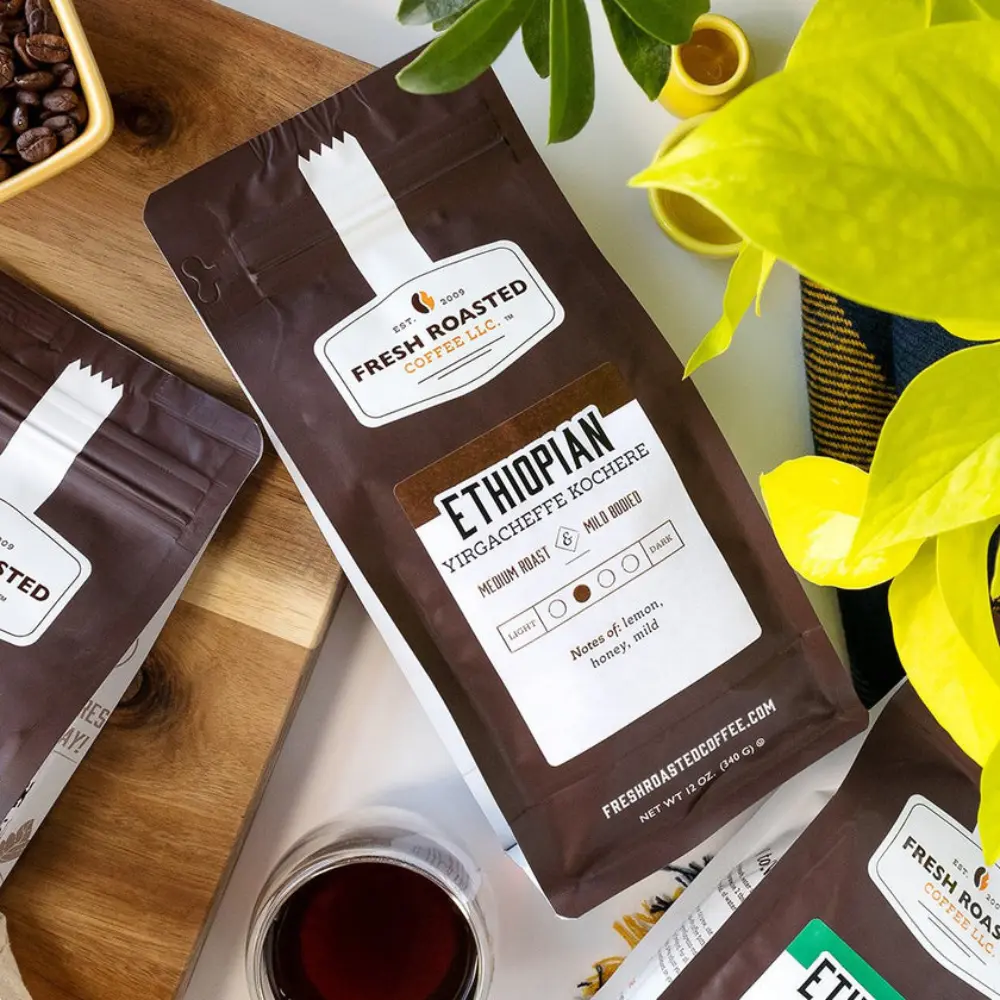
- ETHIOPIAN YIRGACHEFFE KOCHERE COFFEE Is A Well Balanced, Mild African Coffee With Notes Of Lemon And Honey. A Brilliant Choice For Any Coffee Lover.
- SINGLE-ORIGIN FROM KOCHERE, ETHIOPIA. Medium Roast. Heirloom Varietal. Wash Processed & Sun Dried.
- ALL FRESH ROASTED COFFEE IS Kosher Certified, Sustainably Sourced and Proudly Roasted, Blended, and Packaged in USA.
- ALL OUR COFFEES ARE ROASTED in Our Environmentally Friendly Loring Roaster to Reduce Our Carbon Footprint.
- AVAILABLE IN WHOLE BEAN AS 12 OZ, 2 LB, and 5 LB Bags.
Fresh Roasted Coffee brings you the Ethiopian Yirgacheffe Kochere, an exceptional medium roast that embodies a well-rounded, less acidic cup. Boasting dominant lemon flavors, it’s an inviting beverage that proves to be a perfect choice for almost any coffee enthusiast.
- Single-origin coffee from the Kochere district in the Yirgacheffe region
- Medium roast coffee with Maillard (browned and deep) notes
- Washed process to enhance the inherent qualities of the bean
- Dried on raised beds to accentuate flavors
- Composed of an Ethiopian Heirloom variety
Pros:
- Well-rounded flavor profile suitable for most tastes
- Less acidic than other African coffees, making it more stomach-friendly
- Diverse brew methods, from espresso to cold brew
Cons:
- Some coffee lovers might find the citrus notes overwhelming
- The medium roast may not be intense enough for dark roast enthusiasts
Marley Coffee One Love Medium Roast
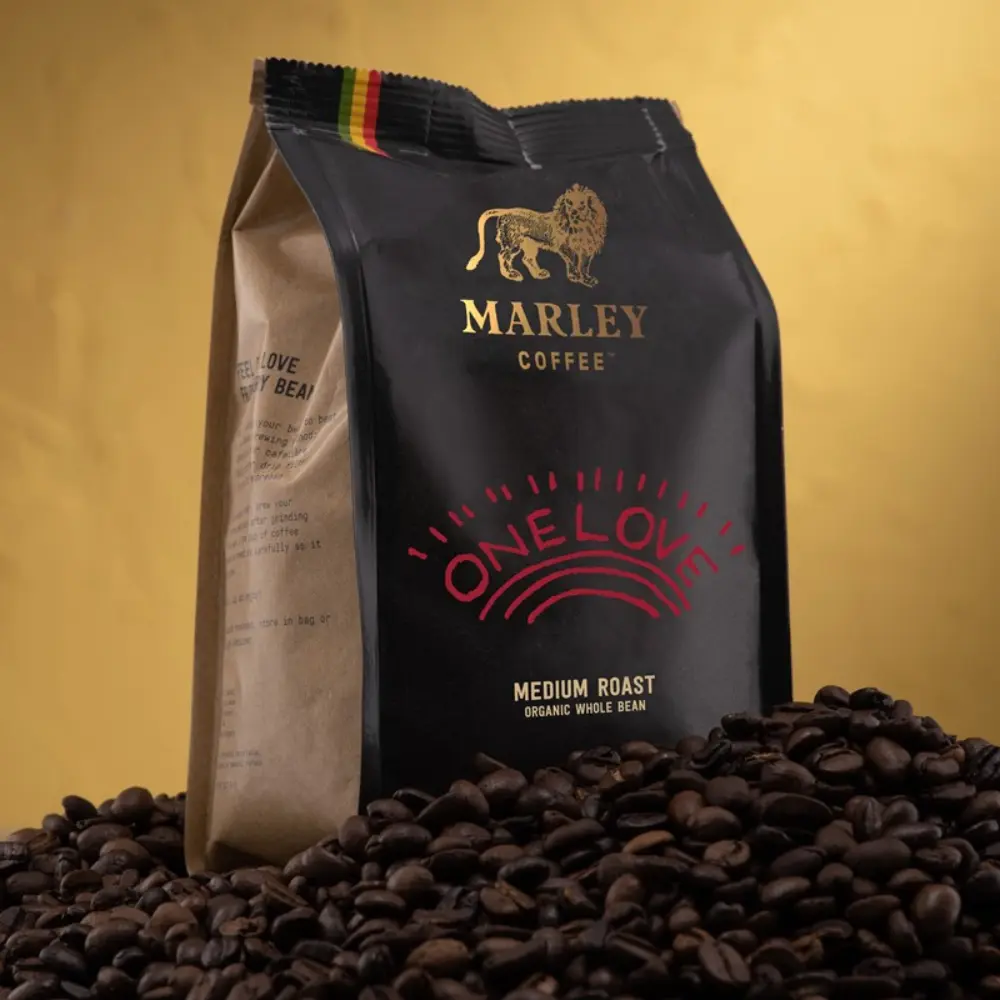
Marley Coffee One Love Medium Roast is a flavorful journey, encapsulating 100% Ethiopian beans into a balanced, smooth, and exotic single-origin experience. With enticing berry notes, this medium roast invites unity and love, reflecting the spirit of the vibrant Ethiopian coffee culture.
- Single-origin, 100% Ethiopian coffee
- Medium roast that is bold yet welcoming
- Offers a smooth experience and balanced flavor
- Prominent berry notes with a smooth, pleasing finish
- Celebrates the Ethiopian culture and its legacy
Pros:
- Smooth and balanced, making it suitable for everyday drinking
- 100% Ethiopian beans, guaranteeing authenticity
- Ideal for both espresso and filter coffee lovers
Cons:
- The flavor profile may be too mild for those preferring a stronger coffee
- Berry notes might not appeal to all tastes
Ethiopian Yirgacheffe by Coffee Bean Direct
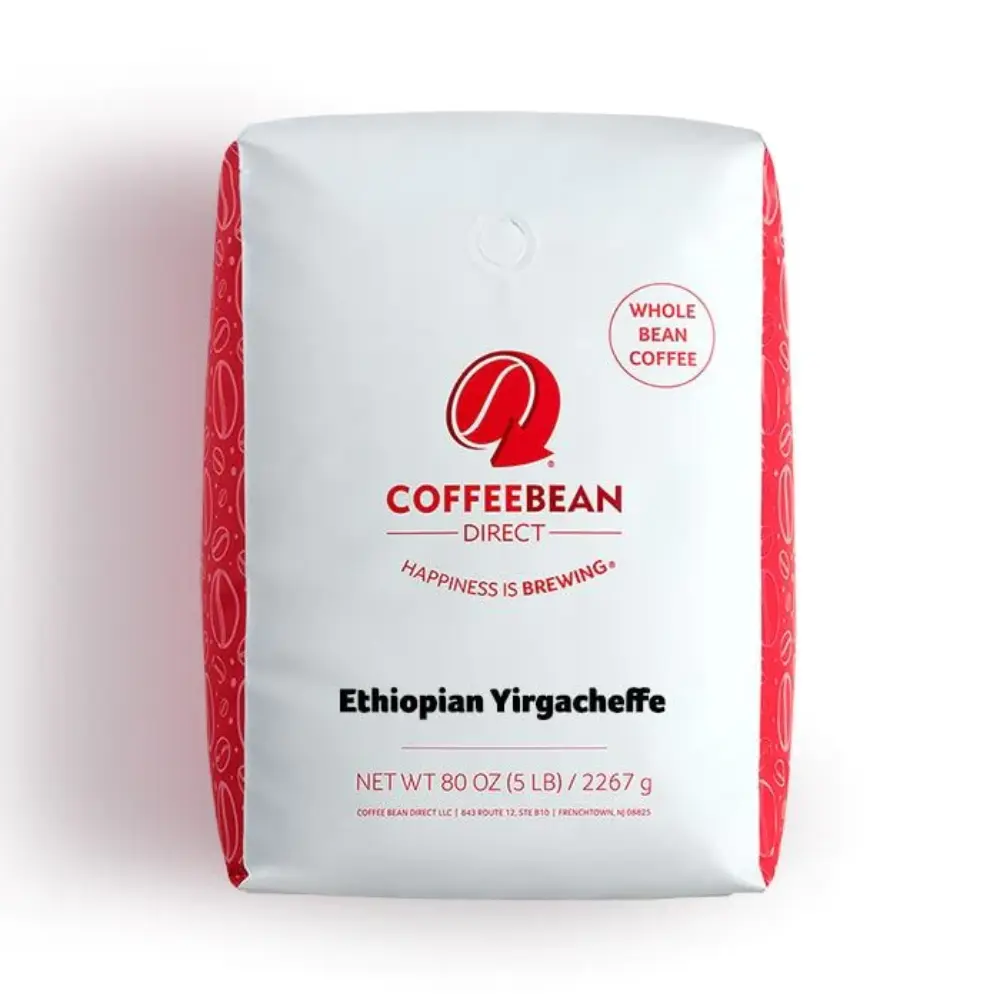
- Ethiopian Yirgacheffe: This light roast offers a smooth body with moderate acidity and chocolaty aroma. With notes of cocoa powder, pecan, and brown sugar, it’s the perfect brew for cool mornings
Delve into the velvety light roast of Ethiopian Yirgacheffe by Coffee Bean Direct. This beverage invites you to a flavorful journey with its gentle touch of acidity, paired with a cocoa aroma. Notes of cocoa powder, pecan, and brown sugar create a harmonious balance, elevating your experience to a new height.
- Light roast coffee from the Yirgacheffe region
- Coffee beans sourced from premium coffee-growing regions
- Features a velvety body and gentle acidity
- Complex flavor notes of cocoa powder, pecan, and brown sugar
- Available in coarse, finely ground, and whole bean offerings
Pros:
- Versatility in brewing methods and coffee presentations
- Light roast offers a variety of nuanced flavors
- Excellent choice for those who prefer less acidity
Cons:
- The light roast and low acidity may not suit those seeking a robust coffee
- The complexity of flavors might be overwhelming for some
Cooper’s Cask Coffee Ethiopian Single Origin
Cooper’s Cask Coffee Ethiopian Single Origin is a journey of extraordinary flavors. This blend marries the vibrant tastes of Ethiopia with expert roasting to create an unparalleled experience.
The unique drying technique leaves the fruit peel pulp on the cherry during drying, introducing a subtle citrus hint to the beans. This technique, combined with the notes of raw honey and wild berries, reveals its full spectrum in the light roast. Dried and roasted in the U.S., this approach ensures the utmost freshness and flavor.
This single-origin coffee, sourced from Ethiopia, provides a bright, clean-tasting experience. With notes of lemon tart, raw honey, and floral nectar, each sip refreshes and revitalizes, akin to the burst of energy from a sunny morning.
Perfect for coffee enthusiasts and beginners alike, this coffee’s small-batch roasting allows the vibrant tasting notes to shine, offering a refreshing start to the day.
- Single Origin from Ethiopia
- Subtle citrus essence from unique drying technique
- Vibrant notes of lemon tart, raw honey, and floral nectar
- Light roast to preserve the beans’ true character
- Dry processed and roasted in the U.S. for optimal freshness
Pros:
- Bright, clean taste experience
- Skillful roasting and processing techniques
- Passionate dedication to quality
Cons:
- Light roast might not cater to those preferring a darker, more robust flavor
- The citrus note could potentially overshadow other flavors for some taste buds
These brands showcase some of the best Ethiopian coffee, presenting an array of choices for coffee connoisseurs and everyday drinkers alike. They not only offer a unique taste of the historic Ethiopian coffee regions but also prioritize ethical and sustainable trade. Try them and experience the rich heritage of Ethiopian coffee for yourself.
The Rich Tapestry of Ethiopian Coffee Varieties
Ethiopia, often hailed as the birthplace of this beverage, is home to an array of remarkable varieties that are revered across the globe. This diverse nation’s unique geographical features, along with its distinct cultural practices, pave the way for an eclectic array of beans. Each region, from Yirgacheffe to Harrar, Sidamo to Gedeb, Lekempti to Tepi, brings its signature flavor, aroma, and character, creating a kaleidoscopic experience. Dive in as we explore the rich tapestry of Ethiopian coffee varieties, appreciating the uniqueness and delight that each brings to the discerning coffee connoisseur.
Yirgacheffe Coffee: The Flavor of Elegance

Nestled in the heart of southern Ethiopia, the region of Yirgacheffe is famed for its exceptional coffee which is often considered the pinnacle of Ethiopian production. Yirgacheffe coffee is renowned for its distinct flavor profile, marked by an exquisite balance of delicacy and depth.
The elegant flavor of Yirgacheffe coffee is a harmonious blend of intricate notes. Infused with a floral aroma and a subtle hint of citrus, each sip reveals layers of complexity. The drink’s flavor is further defined by undertones of berry and wine, providing an invigorating twist to the experience. It’s not uncommon to identify traces of spices, creating a captivating dance of tastes that lingers on the palate.
- Flavor Profile: Floral aroma with subtle citrus notes, undercurrents of berry and wine, and potential traces of spices.
- Region: Grown in the Yirgacheffe region of southern Ethiopia.
- Ideal for: Coffee enthusiasts seeking a complex and refined flavor profile.
Sidamo Coffee: A Symphony of Aromas

Sidamo coffee, grown in the fertile highlands of southern Ethiopia, is celebrated for its rich, full-bodied flavor and vibrant aroma. With its distinct taste and quality, Sidamo coffee encapsulates the lush biodiversity of the region, offering coffee lovers a sensory journey into Ethiopia’s unique culture.
The aromatic profile of Sidamo coffee is a symphony of rich flavors. Characterized by its distinctive acidity, Sidamo coffee exudes a rich aroma marked by traces of berries and citrus. The profile is further enriched by a potent undercurrent of dark chocolate, intertwined with a fragrant hint of floral notes. This blend of tastes results in a well-rounded cup that is both vibrant and comforting.
- Flavor Profile: Spicy notes, dark chocolate undertones, and fragrant hints of floral and citrus.
- Region: Grown in the high-altitude Sidamo region of southern Ethiopia.
- Ideal for: Coffee aficionados who enjoy an aromatic and full-bodied experience.
Harrar Coffee: The Taste of Tradition
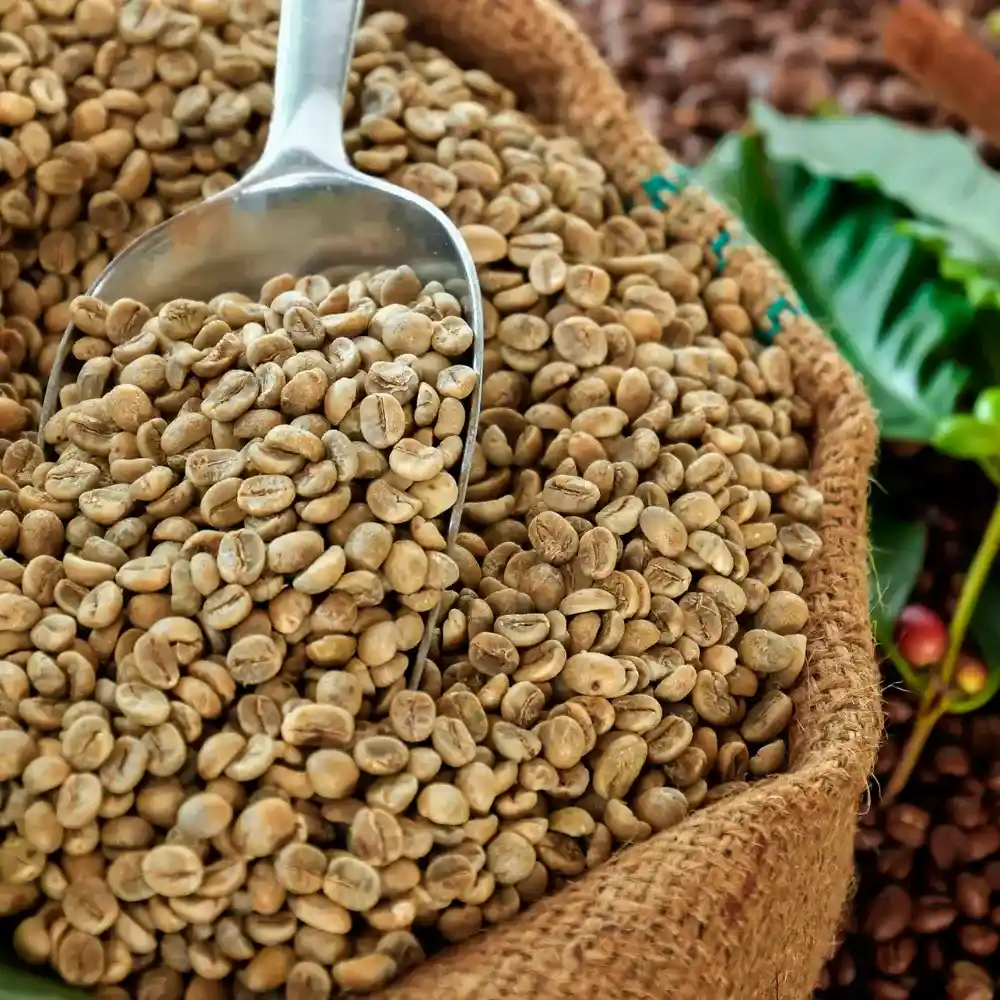
Harrar coffee, cultivated in southern Ethiopia, particularly in the Oromia region (formerly Harrar), is revered for its traditional processing methods that result in a bold and unique flavor profile. A timeless classic, Harrar coffee is a testament to Ethiopia’s rich heritage, offering a taste that is deeply rooted in the region’s history and culture.
The robust flavor of Harrar coffee is best described as wild and exotic. Its strong, wine-like acidity is perfectly balanced by the prominent notes of ripe red fruits and dark chocolate. The dry processing method, traditional to Harrar, results in a beverage with a heavy body and a distinct floral flavor. All these attributes combine to create a cup of joe that is both rich and deeply satisfying.
- Flavor Profile: Wine-like acidity, notes of ripe red fruits, and dark chocolate, with a distinct floral flavor.
- Region: Cultivated in the Harrar region in southern Ethiopia.
- Ideal for: Those who prefer a robust, heavy-bodied coffee with a complex flavor profile.
Guji Coffee: A Melodic Mix of Flavors
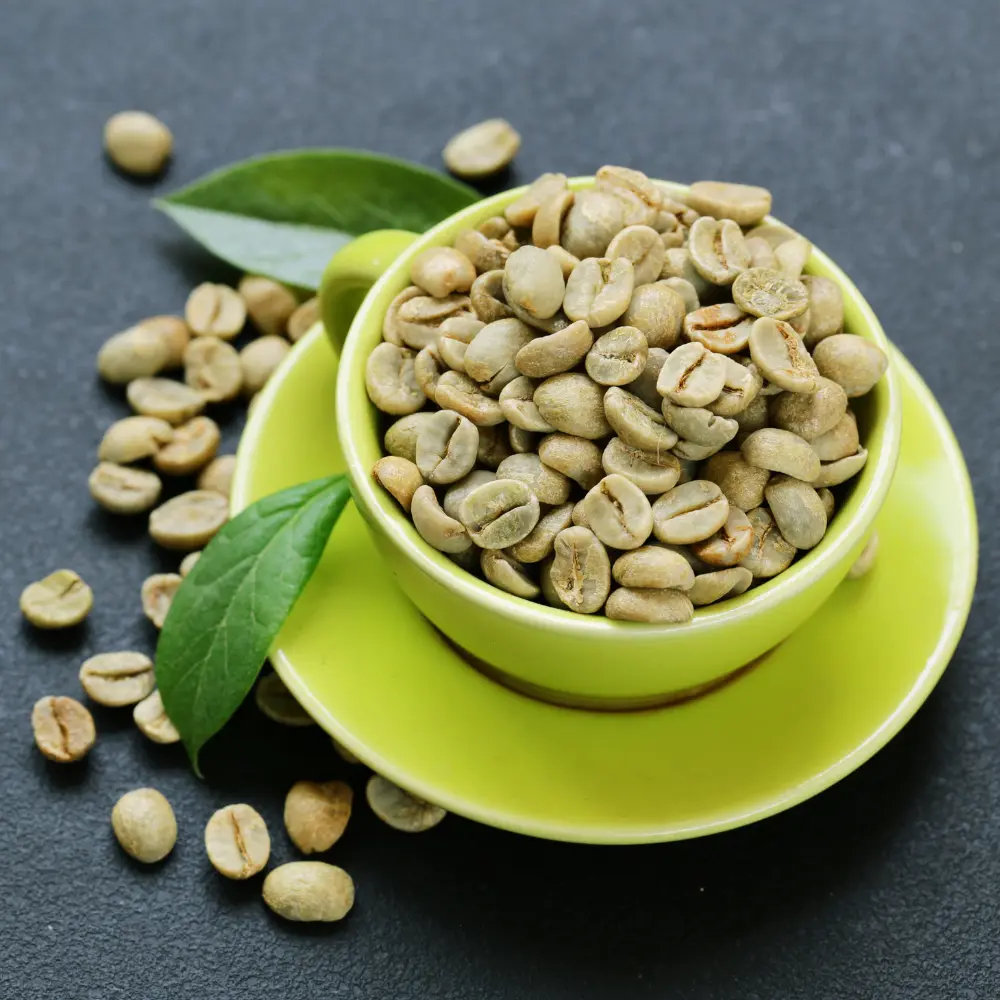
The Uraga region, located in the Guji zone, produces an exceptional variety of coffee known as Guji coffee. The region’s favorable climate and fertile soils nurture the growth of this distinctive variety, giving it a special place in Ethiopia’s illustrious landscape.
Guji coffee is characterized by its melodic mix of flavors that echo the region’s rich natural biodiversity. Its taste is often described as fruity, with pronounced notes of ripe berries, citrus, and lemon. The acidity of these flavors is balanced by a soft, tea-like undertone, and a distinct floral aroma, culminating in a satisfying, nuanced finish.
- Flavor Profile: Pronounced acidic notes (berries, citrus, lemon), tea-like undertone, and a floral aroma.
- Region: Grown in the Uraga region, located in the Guji zone in southern Ethiopia.
- Ideal for: Coffee lovers looking for a citrusy, aromatic cup with balanced sweetness.
Limu Coffee: The Sweet and Spicy Treat

Limu coffee originates from the southwest highlands of Ethiopia, a region famous for its coffee production. It is known for its unique taste profile, which is often described as sweet and winey, capturing the essence of the diverse terrain where it’s grown.
The flavor of Limu coffee unfolds with a blend of warm spice notes, complemented by a sweet, wine-like acidity. Undertones of dark chocolate and black tea add depth to its profile, while the subtle hint of citrus zest gives it a refreshing finish. All these elements are harmoniously blended, creating a delightful experience.
- Flavor Profile: Warm spice notes, wine-like acidity, undertones of dark chocolate and black tea, and a hint of citrus zest.
- Region: Grown in the southwest highlands of Ethiopia.
- Ideal for: Those who appreciate a unique balance of sweet and spicy flavors in their beverage.
Jimma Coffee: The Smooth Operator
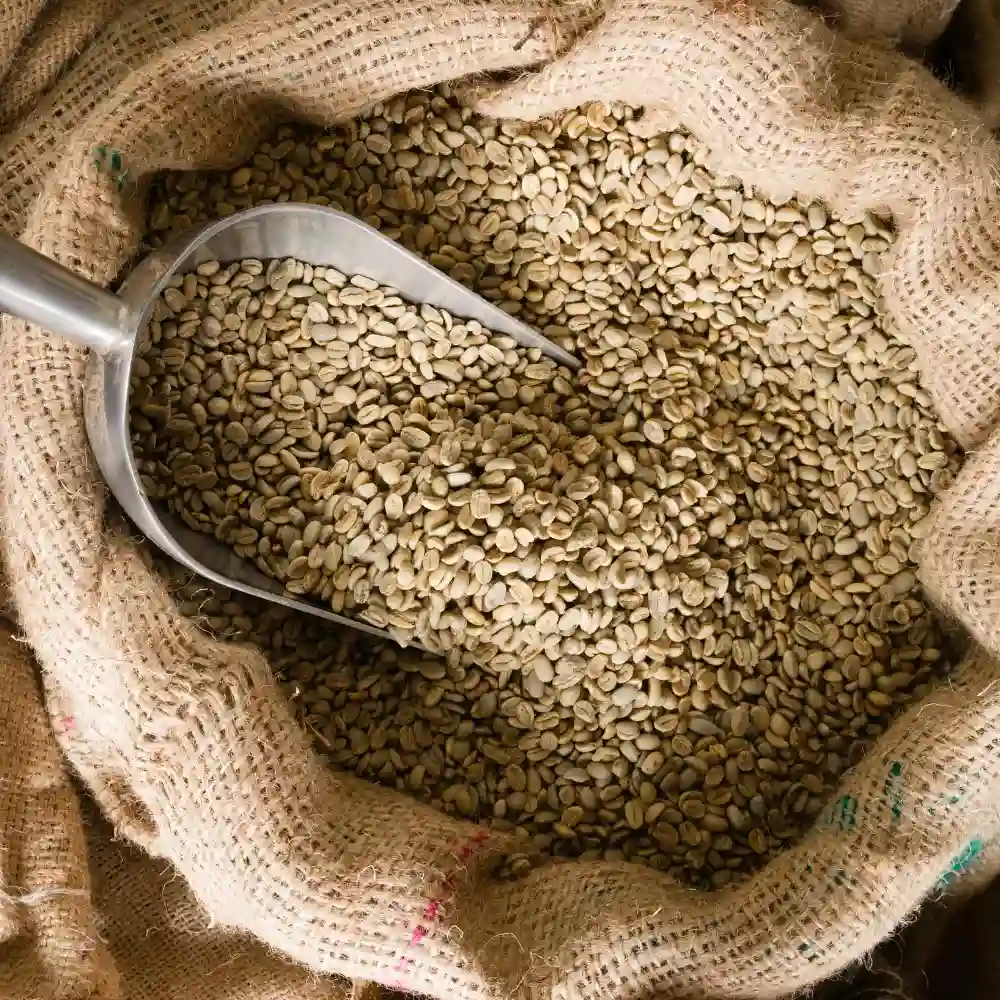
Jimma coffee, hailing from the southwestern Oromia region of Ethiopia, is well-loved for its smooth body and rich, full flavors. This variety stands out due to its traditional, ‘garden coffee’ cultivation method, where coffee shrubs are interspersed with other crops, contributing to the unique taste profile.
Jimma coffee offers a flavor that is both smooth and rich. Its profile is marked by a strong, earthy taste, layered with notes of spices and a slight hint of dried fruits. This balance of flavors is complemented by a full-bodied texture, culminating in a harmonious and satisfying cup of joe.
- Flavor Profile: Earthy taste, spice notes, and a hint of dried fruits.
- Region: Grown in the Jimma region of southwestern Ethiopia.
- Ideal for: Coffee enthusiasts who enjoy a full-bodied, rich coffee with an earthy taste.
Gedeb Coffee: The Bright and Floral Symphony

Gedeb coffee, south of Yirgacheffe, in the Gedeo zone in southern Ethiopia, is recognized for its bright and floral profile. This variety is grown at high elevations, contributing to its vibrant taste and aromatic intensity.
Flavors within Gedeb coffee are bright, citrusy, and floral. There are dominant notes of lemon and jasmine, underpinned by a gentle sweetness, reminiscent of honey. This beverage offers a clean finish, which leaves a refreshing aftertaste.
- Flavor Profile: Bright citrusy notes, floral tones, and honey-like sweetness.
- Region: Grown in the Gedeo zone in southern Ethiopia.
- Ideal for: Coffee drinkers who prefer a bright, citrusy cup with a clean finish.
Lekempti Coffee: The Wild and Winey Delight
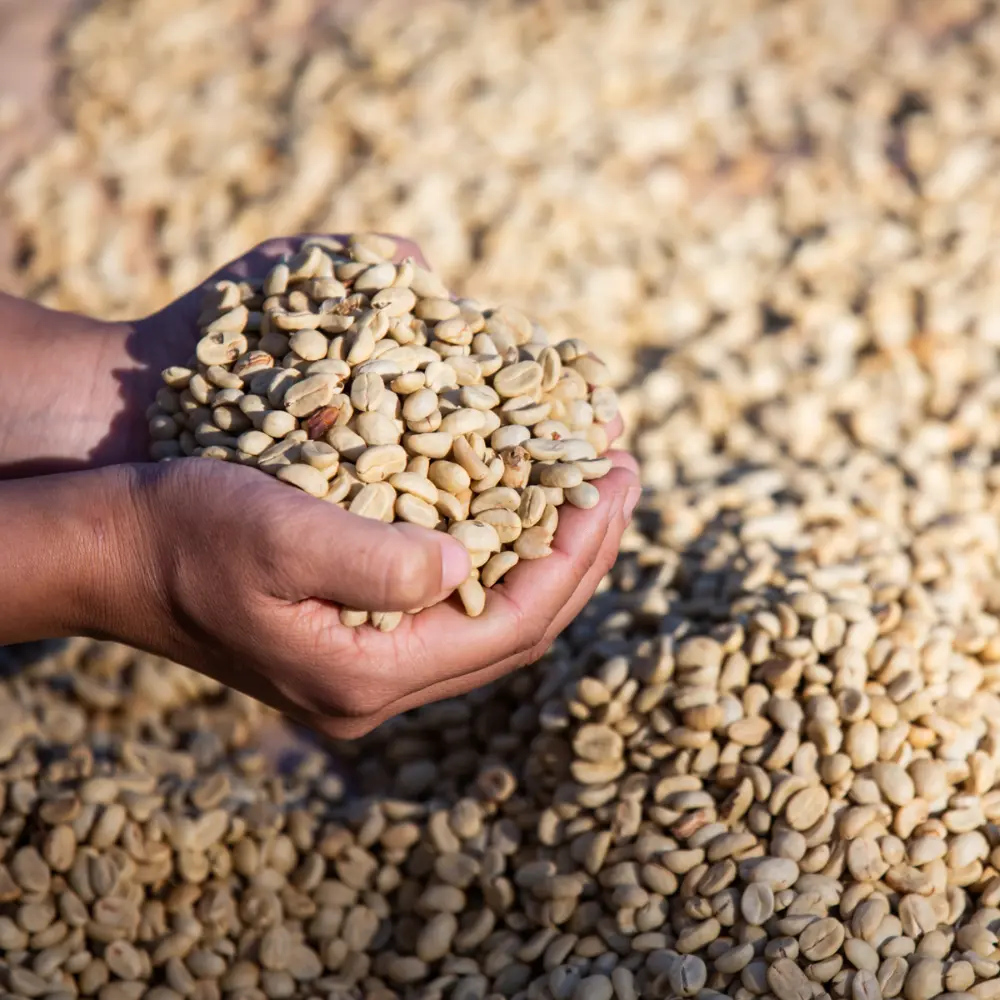
Lekempti coffee, from the western part of Ethiopia, boasts a wild, winey profile. It is known for its unique drying method, where coffee cherries are sun-dried on raised beds, contributing to its distinctive taste.
This variety reveals a winey flavor with a wild, fruity sweetness. There are prevalent notes of berries and dried fruits, enriched by an undercurrent of dark chocolate. It finishes with a wine-like tanginess that lingers on the palate.
- Flavor Profile: Winey flavor, fruity sweetness, and notes of dark chocolate.
- Region: Grown in the western part of Ethiopia.
- Ideal for: Those seeking a unique, wild, and winey flavor.
Tepi Coffee: The Bold and Earthy Elixir

Tepi coffee, originating from the southwestern region of Ethiopia, is recognized for its bold and earthy flavor profile. Grown in fertile soils at high altitudes, this variety boasts a rich and heavy body, characteristic of the region’s coffee.
Tepi coffee unveils a bold, earthy flavor, complemented by notes of dark chocolate and spices. It has a full body and a low acidity, which leaves a heavy, satisfying finish on the palate.
- Flavor Profile: Bold, earthy flavor, notes of dark chocolate, and spices.
- Region: Grown in the southwestern region of Ethiopia.
- Ideal for: Coffee enthusiasts who enjoy bold, full-bodied coffee with an earthy flavor.
The Art of Ethiopian Coffee Brewing
Delve into the heart of Ethiopia’s rich culture and immerse yourself in the deeply rooted tradition of this drink’s brewing. Coffee, in this land of diversity, is more than a beverage – it’s a symbol of unity, a conduit for socialization, and a testament to Ethiopia’s rich heritage. We’re journeying into the nuances of the cherished Ethiopian coffee ceremony, home brewing techniques, and finding the ideal grind for these illustrious beans.
The Traditional Ethiopian Coffee Ceremony
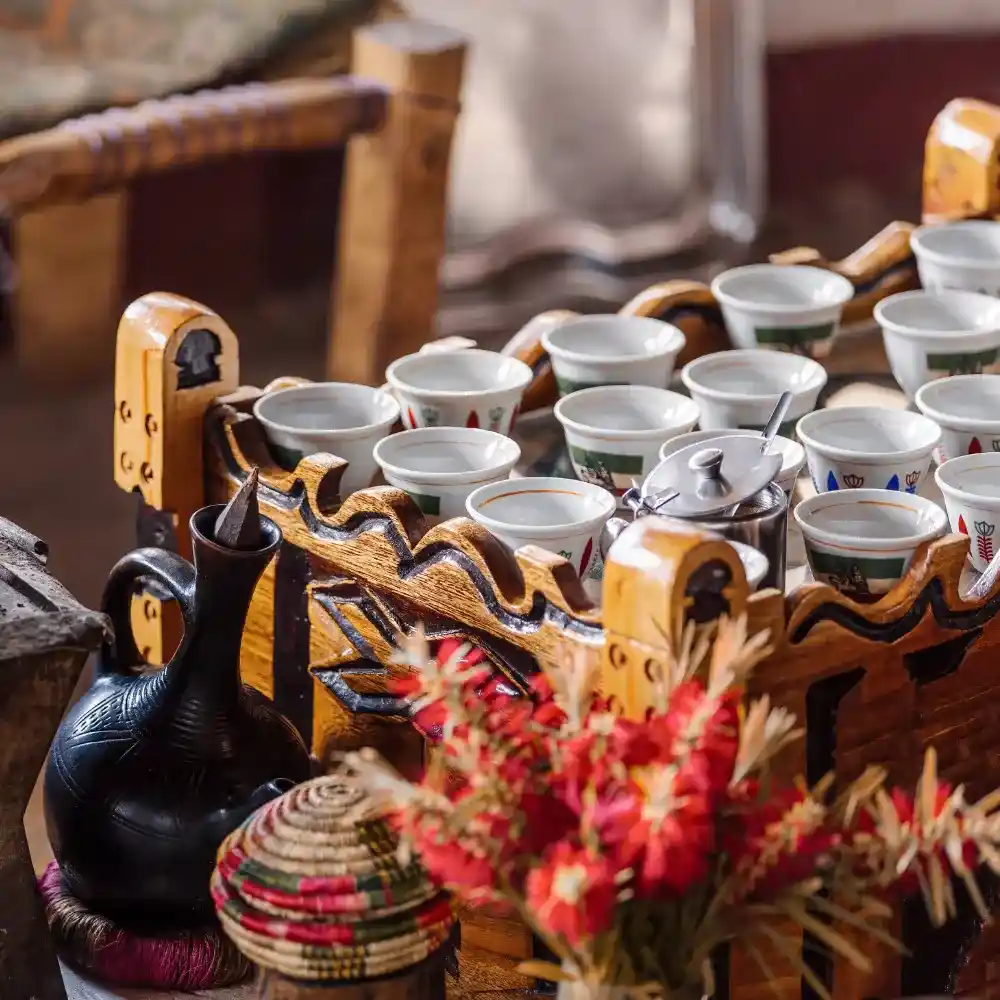
Step into the captivating world of the Ethiopian Coffee Ceremony, an age-old tradition that serves as a communal cornerstone. As discussed earlier, this ritual, steeped in symbolic gestures and sequences, showcases the central role of this beverage within Ethiopian and Eritrean communities. While this drink remains the star of the ceremony, tea also holds a respectable place, standing by for those who might prefer its gentler flavor.
Envision the ceremonial space: the ground is laid with fresh grass, scattered with delicate yellow blossoms enhancing the overall ambiance. On special occasions, vibrant composite flowers join the scene, offering a glimpse of Ethiopia’s cultural richness. The woman of the house, traditionally bestowed with the honor of conducting the ceremony, orchestrates the elaborate coffee-making process.
The brewing process unfurls like a well-rehearsed dance, starting with the roasting of green beans over an open flame, releasing an intoxicating aroma. The beans, once perfectly roasted, are ground meticulously, using a traditional wooden mortar and pestle. The grounds then meld with boiling water in a jebena, a ceramic jug featuring a round base, slender neck, and handle. Its unique shape is sealed with a straw lid, capturing the essence of Ethiopian craftmanship.
In the spirit of unity, the host gracefully pours the coffee from a height into petite handleless cups, ensuring each participant receives their share. Three brewing rounds are conducted – awel (or abol in Amharic), kale’i (or tona in Amharic), and the final round, baraka, translating to ‘blessing’ in both languages. Accompanied by the soothing fragrance of traditional incense and optional additions of sugar, salt, or even niter kibbeh (traditional butter), the Ethiopian coffee ceremony is truly an immersive experience.
Brewing Techniques for Ethiopian Coffee at Home

While the traditional Ethiopian Coffee Ceremony may not be feasible daily, the essence of Ethiopian coffee can still be enjoyed at home. Start with freshly roasted Ethiopian beans and ensure they are ground just before brewing to preserve their aromatic oils. Use a pour-over technique, such as a Chemex or V60, to allow this drink’s intricate flavors and delicate acidity to shine through. Aim for a brewing temperature of around 200 degrees Fahrenheit (93 degrees Celsius) and a brewing time of around 2-3 minutes for optimal extraction.
Ideal Coffee Grind for Ethiopian Beans
Finding the perfect grind for Ethiopian coffee is key to unlocking its full flavor profile. Ethiopian beans are often quite dense due to their growth at high altitudes. For a pour-over method, aim for a medium-fine grind, similar to the texture of table salt. This grind size allows for an optimal extraction time, enhancing the beverage’s bright acidity and complex flavor notes. For an espresso machine, you’ll need a finer grind, while a French press or cold brew setup will require a coarser grind. Remember, grind size significantly impacts the taste of your cup of joe, so feel free to experiment to discover your perfect cup.
Choosing and Buying Ethiopian Coffee
Entering the world of Ethiopian coffee, rich in variety and full of diverse flavor profiles, is a delightful journey. To fully appreciate it, understanding what to look for on labels, the significance of fair trade, and the best practices for storing these precious beans is essential. Let’s guide you through the process of selecting, buying, and maintaining the freshness of your Ethiopian coffee.
Decoding the Label: What to Look for when Buying Ethiopian Coffee
Understanding the label on your coffee is like uncovering a road map to the coffee’s journey from the Ethiopian highlands to your cup. Key details include the region, the coffee’s grade, the altitude at which it was grown, and the processing method. Ethiopian coffee comes from several renowned regions like Yirgacheffe, Sidamo, and Harrar, each known for their unique flavor profiles.
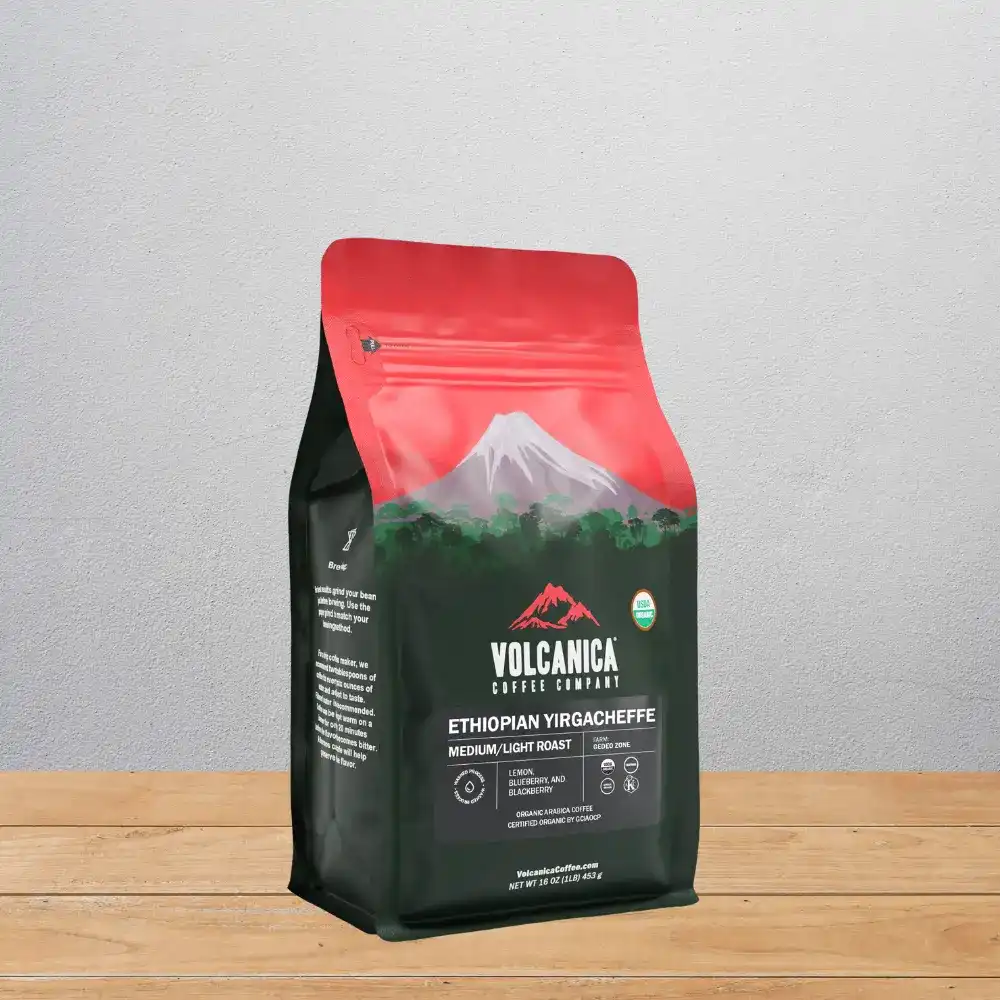
The grade reflects this beverage’s quality and is determined by factors such as bean size, shape, and defect count. Beans grown at higher altitudes often deliver a more complex, desirable flavor profile, while the processing method (washed or natural) significantly influences the taste. Washed coffees tend to have a cleaner, lighter body with brighter acidity, while naturally processed coffees offer more robust and fruity flavors.
Lastly, look for “100% Arabica” on the label, as all Ethiopian coffee should be Arabica. This species is more flavorful and aromatic compared to the less expensive Robusta variety.
Fair Trade and Ethical Purchasing
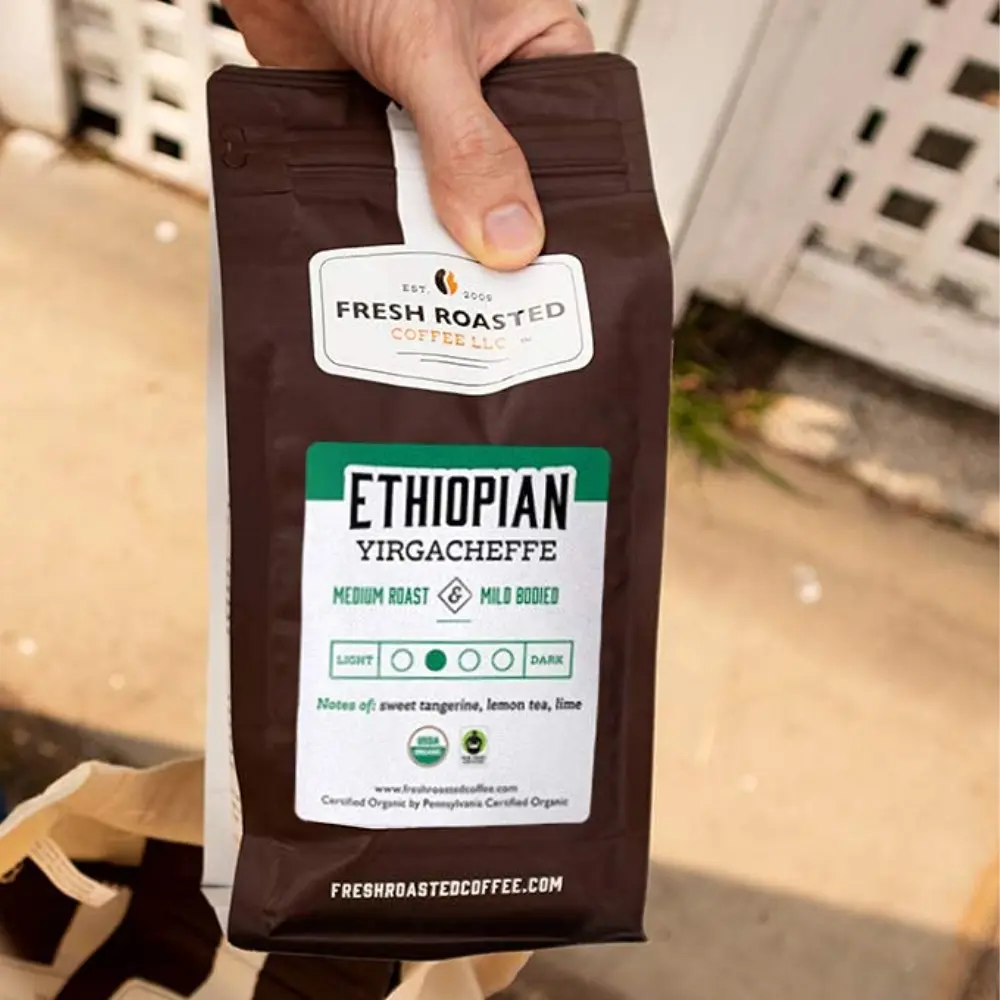
Opting for fair trade beans ensures the producers receive fair compensation for their labor and encourages sustainable farming practices. Fair Trade certification helps to protect farmers from fluctuating market prices, guarantees a minimum price for their beans, and invests in community development in coffee-producing regions. By buying fair trade coffee, you directly support the economic growth of these communities, reinforcing ethical business practices and contributing to sustainability.
Storing Ethiopian Coffee for Freshness
Ensuring the freshness and flavor of your Ethiopian coffee starts with knowing how to properly store the beans. Always store your coffee beans in a cool, dry place, away from light, moisture, and heat sources, as they can degrade the drink’s quality. Airtight containers made of ceramic or non-reactive metal are ideal for preserving the coffee’s freshness.
Avoid refrigerating or freezing your coffee as the temperature fluctuations can lead to moisture accumulation and condensation, potentially damaging the beans. Only buy in quantities you will use within a couple of weeks as coffee’s flavor starts diminishing after two weeks post-roasting. Remember, fresh coffee is the best, so buy in small amounts, and enjoy it while it’s at its peak.
Exploring the Taste Profile of Ethiopian Coffee
Delving into the world of Ethiopian coffee is an exploration of vibrant flavor profiles and aromatic experiences. This journey includes understanding the unique flavor notes, finding the perfect food to complement these coffees, and fully immersing oneself in the rich, multi-sensory tasting experience.
Identifying the Flavor Notes in Ethiopian Coffee
Ethiopian coffee is renowned for its complex flavor profile, often characterized by floral, fruity, and wine-like notes that make it distinct from coffees grown in other parts of the world. Coffee from the Yirgacheffe region, for example, is known for its delicate, tea-like characteristics and bright acidity, often marked by flavors of citrus and stone fruits. Harrar coffee, on the other hand, is wild and winey with a heavy body and vibrant acidity, complemented by fruity and mocha notes. Sidamo coffee typically showcases a rich, full body and bright acidity, with complex notes of red berries, wine, and spices.
It’s essential to note that the flavor experience begins even before the first sip, with the aroma of the coffee playing a significant role. The act of smelling this lovely beverage, often referred to as “cupping coffee“, awakens your senses to the forthcoming flavors and contributes to the overall experience.
Coffee Pairing: Foods that Complement Ethiopian Coffee

Coffee pairing is the practice of matching different coffees with particular foods to enhance the culinary experience. Just like wine, this beverage has a broad range of flavors, and pairing it with the right food can elevate the tasting journey.
For fruity and floral Ethiopian coffees, like those from the Yirgacheffe region, consider light pastries, fruit tarts, or almond cookies. These pairings allow the delicate flavors and bright acidity of the coffee to shine. Harrar coffee, with its bolder and wild notes, pairs well with dark chocolate, which can complement and contrast the coffee’s inherent wildness and fruitiness. Sidamo coffee, known for its complexity and spicy undertones, can be paired with spicy or savory pastries, complementing its flavor profile.
Tasting Ethiopian Coffee: An Experience Beyond Taste
Enjoying Ethiopian coffee is more than just an act of consumption; it’s a complete sensory journey. From the initial visual inspection of the beans, where you appreciate their color and form, to the auditory pleasure of hearing them being ground, the experience begins even before the coffee reaches your taste buds.
Cupping coffee – inhaling deeply to experience the aroma – is a critical step. These fragrances set the tone for the flavors you’re about to experience, preparing your palate for the vibrant journey ahead.
Finally, when you take your first sip, let the coffee swirl in your mouth. This way, it reaches all your taste buds, allowing you to appreciate its full body, acidity, and unique flavor notes. By truly savoring this cup of joe, you immerse yourself in its narrative, a story that speaks of its Ethiopian origin, the farmers who nurtured it, and the rich cultural heritage it represents.
Conclusion
In conclusion, the coffee culture in Ethiopia is rich and diverse, offering a range of unique experiences for coffee lovers around the world. Each variety of Ethiopian coffee discussed in this article brings its own personality to the table, from the fruity notes of Harrar to the refined elegance of Yirgacheffe and the robust flavors of Sidamo and Limu.
However, if we were to choose a top pick, it would have to be the Volcanica Ethiopian Yirgacheffe Coffee. This selection stands out among the best Ethiopian coffee varieties for its delicate yet vibrant flavor profile, encapsulating the unique coffee-growing conditions of the Yirgacheffe region. Its enticing aroma and balanced acidity make it an extraordinary blend, delivering a clean and bright taste that lingers pleasantly on the palate. The exotic floral and fruity undertones, combined with a hint of wine, make each cup a delightful experience that transports you straight to the heart of Ethiopia.
The team at The Coffee Guru is committed to guiding you on your exploration journey, and we believe the Volcanica Ethiopian Yirgacheffe Coffee offers a perfect entry point or a new addition for those already immersed in Ethiopian coffee culture. Its singular taste profile, combined with the exceptional care taken in its cultivation and preparation, exemplifies the rich coffee heritage of Ethiopia. Enjoy your journey through the aromatic landscapes of Ethiopian coffee, starting with our top pick, and happy brewing!
FAQ
What are the different types of Ethiopian coffee?
The primary types include Yirgacheffe, Sidamo, Harrar, Limu, and Guji, each offering distinct flavors and aroma profiles.
How do traditional Ethiopian coffee brewing methods impact the flavor?
Traditional brewing methods, like the Ethiopian coffee ceremony, often involve freshly roasting and grinding beans, resulting in a richer, fresher flavor profile.
How can I ensure I'm buying high-quality Ethiopian coffee?
Ensure you're buying high-quality Ethiopian coffee by checking labels for 100% Arabica, the specific growing region, and certifications like Fair Trade and Organic.
How to store Ethiopian coffee to maintain its freshness?
To maintain its freshness, this beverage should be stored in an airtight container, away from light, heat, and moisture, ideally in a cool, dark place.
